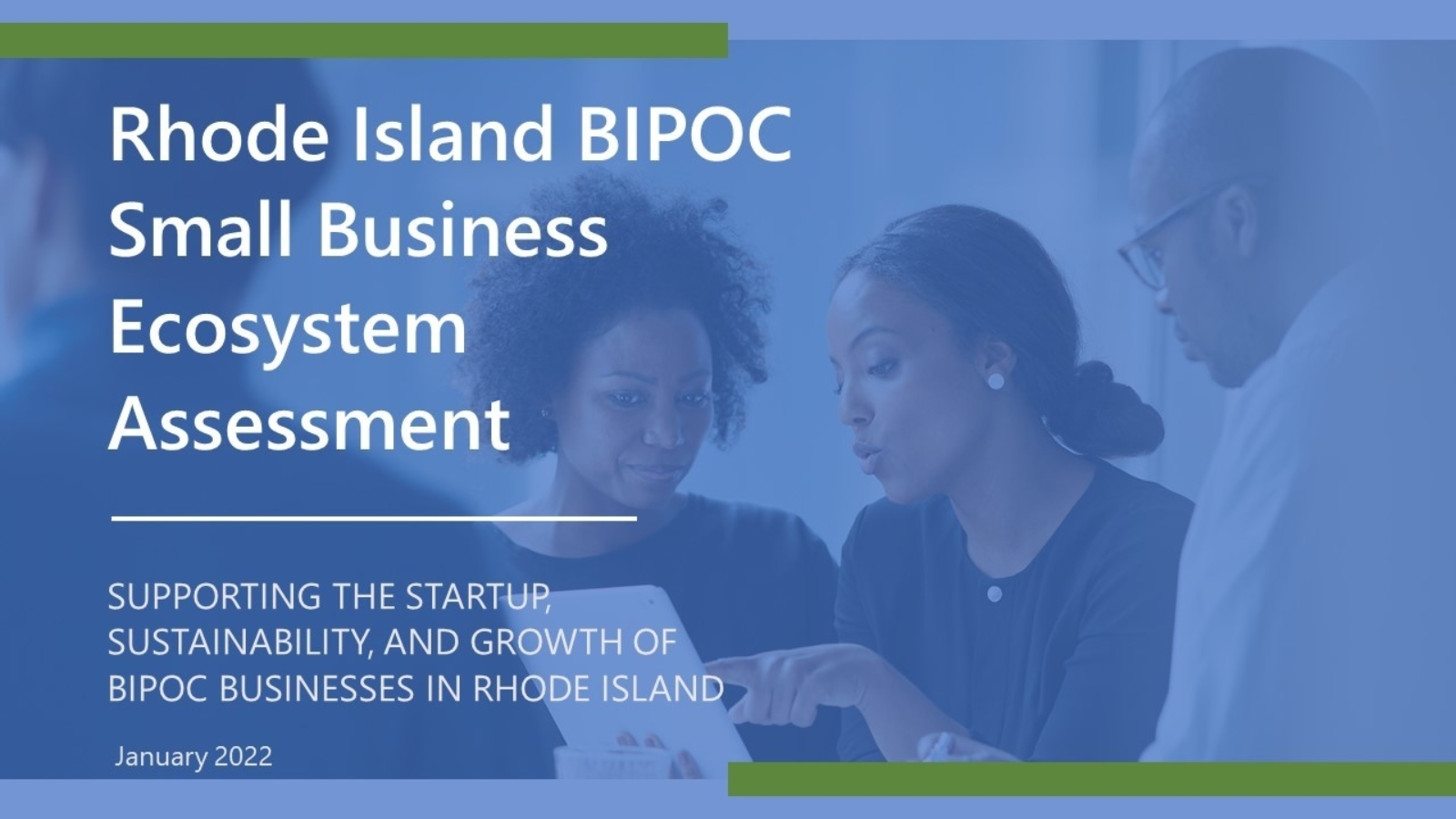
Publication
Rhode Island BIPOC Small Business Ecosystem Assessment
Supporting the startup, sustainability, and growth of BIPOC businesses in Rhode Island
In partnership with Rhode Island Commerce, the Foundation recently commissioned a study to promote the growth of, and support for, BIPOC businesses in our state.
The work was guided by an active community-based steering committee that included: Junior Jabbie, Banneker Supply Chain Solutions; Roby Luna, Aretec, Inc.; Donna Sams, Spencer Consulting Group; Keith Stokes, City of Providence; and Vanessa Toledo-Vickers, Citizens Bank.
The assessment itself was completed by Camoin Associates and EntreWorks Consulting. The recommendations contained in the assessment are based on robust local business engagement over a period of months that ensured community voice, as well as data review, and review of best practices from around the nation. The goal of the work is really to engage existing organizations and new partners to expand outreach and support for minority businesses throughout Rhode Island.
According to the study, the white population in Rhode Island declined by nearly 4% from 2010 to 2020, while the combined increase of all other ethnic groups was nearly 27%. In addition, BIPOC business participation in Rhode Island lags the national average. About 7.4% of the state’s 21,000 businesses have BIPOC owners. Nationally, 18.3% of all businesses with employees are BIPOC-owned, more than twice the rate for Rhode Island.
Minority-owned businesses are a growing and crucial segment of the state’s business sector. This effort builds upon the Foundation’s commitments to small business growth, job creation, equity and inclusion as key to economic success for all Rhode Islanders.
Rhode Island Commerce, expects to include the recommendations as part of Governor McKee’s RI 2030 planning effort.
The study’s recommendations include:
CAPITAL | Develop new funding vehicles targeted to the needs of BIPOC-owned businesses.
• A new Community Development Finance Institution (CDFI) focused on BIPOC-owned ventures
• New investment pools targeted to BIPOC-owned ventures
• Support for newer programs, such as crowdfunding platforms and BIPOC-led angel investor networks, to diversify funding sources available for Rhode Island-based entrepreneurs
WORKFORCE AND TALENT | Ensure that every Rhode Islander with entrepreneurial ambitions can get the training and coaching needed to start a new venture.
• Require entrepreneurship training for all K-12 students
• Expand entrepreneurship education options at community colleges
• Expand availability of self-employment assistance programs
BUSINESS ASSISTANCE | Increase availability and visibility of technical assistance programs for BIPOC business owners and aspiring entrepreneurs.
• Provide business concierge and wayfinding support to BIPOC-owned businesses
• Create a new Business Builder Voucher program to help entrepreneurs access outside consulting assistance and support
• Create and sustain a statewide Minority Business Support Coalition
SPECIALIZED INFRASTRUCTURE | Provide increased access to specialized support efforts such as business incubators and co-working spaces.
• Locate new co-working spaces in neighborhoods and locations easily accessible to BIPOC residents
• Increase commercial kitchen and shared processing facilities
COMMUNITY CULTURE | Create local buzz and excitement about entrepreneurship.
• Expand availability of entrepreneurship education for all Rhode Islanders
• Support regular event series to learn and share ideas related to innovation, creativity, and entrepreneurship
SUPPORTIVE REGULATION | Ensure “entrepreneur-friendly” state and local laws and regulations.
• Create small business ombudsman position to address small business concerns
• Improve training to local government staff on effective “entrepreneur-friendly” practices and programs
• Continue ongoing state-level regular reform efforts
MARKET ACCESS | Help BIPOC entrepreneurs gain access to new markets at home and abroad.
• Support a BIPOC Business Accelerator program, as also recommended in RI Commerce’s Rhode Island Innovates 2.0 plan to connect fast-growing BIPOC business to major corporate partners and customers
• Support reform of current MBE/WBE programs
• Develop a business succession program targeted to BIPOC residents and business owners



